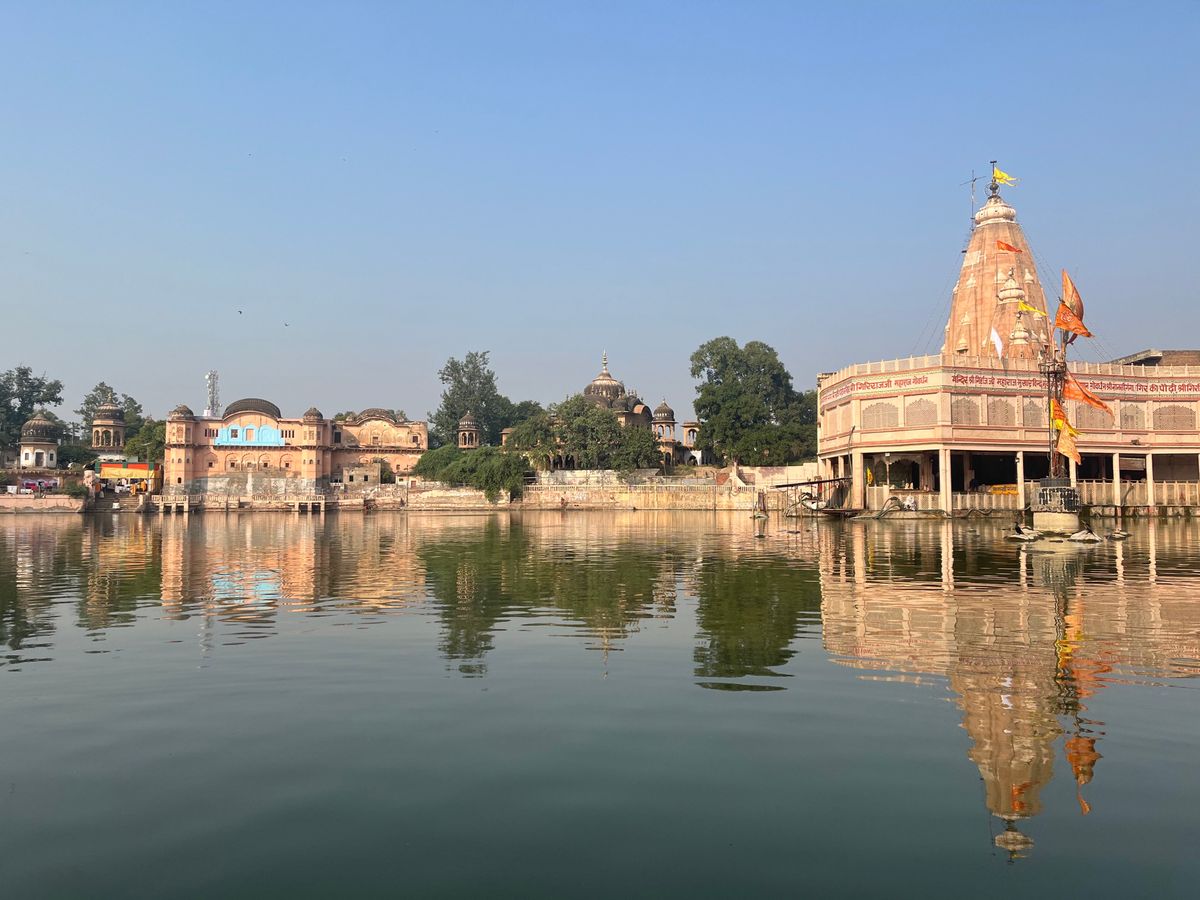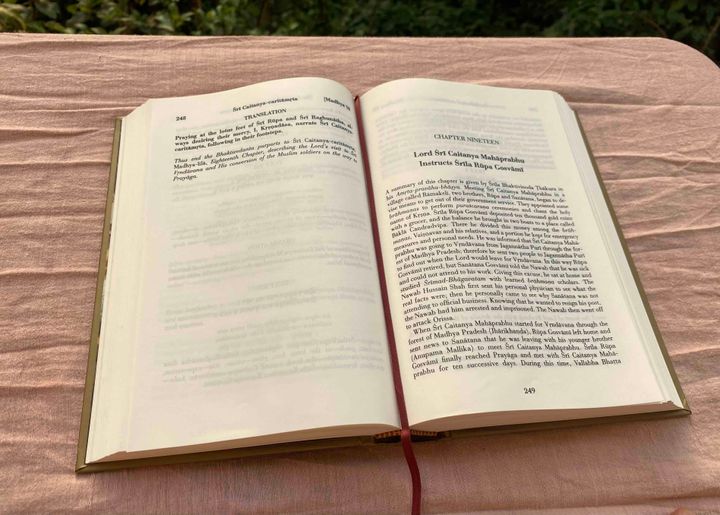R-s 1 💧 One Drop from the Ocean of Bhakti-rasa

❧ Cc Madhya 19.137 ❧
Welcome to Week 1 of our Rūpa-śikṣā program. I am excited to be starting this with you today. :)
If you’re short on time, that’s fine, you can skip around the sections below. Also, if you are here for the Zoom meeting links, you’ll find them at the bottom of the page.
What we will be studying over the next fourteen weeks
I divided Rūpa-śikṣā into two parts. We will be studying the first part until Śrīla Rūpa Gosvāmī’s disappearance day, August 9th.
Śrīla Bhakti Śrīrūpa Siddhāntī Gosvāmī Mahārāja, a disciple of Śrīla Sarasvatī Ṭhākura Prabhupāda, summarized the first part of Rūpa-śikṣā nicely in his Upadeśāmṛta:
Among all the jīvas who are wandering throughout the universe, one who has accrued spiritual merit over many lifetimes obtains the seed of the creeper of bhakti, or śraddhā. This takes place when the jīva, by Kṛṣṇa’s mercy, is favoured by His dear associates. Endowed with that śraddhā, the disciple as a gardener, plants that seed in his heart. He waters it by hearing and chanting the instructions flowing from the mouth of Śrī Gurudeva. Thus by these activities, the creeper sprouts and gradually climbs to the lotus feet of Śrī Kṛṣṇa.
That creeper of bhakti passes beyond this universe, and beyond the Virajā River, Brahma-loka and Paravyoma, the spiritual sky, and goes to Goloka Vṛndāvana where it climbs the kalpa-vṛkṣa (wish-fulfilling tree) of Śrī Kṛṣṇa’s lotus feet. The gardener, still in this world, continues to irrigate the creeper with the water of śravaṇa and kīrtana and thus welcomes the fortune of tasting the fruit of prema.
If, in the stage of sādhana, innumerable weeds, such as the desire for enjoyment, liberation, material gain, worship and fame grow, as well as the tendency to engage in prohibited behaviour – cheating, violence, and so forth – then the main plant cannot grow. At the time of watering it, the sādhaka will first cautiously cut the weeds so that they don’t grow.
One fault can arise that is most detrimental to the bhakti-sādhaka. It is known as vaiṣṇava-aparādha and it can either uproot or cut the creeper of devotion like a mad elephant uproots a plant. As a result, the creeper of devotion immediately dries up. Therefore, the sādhaka is to remain diligent to ensure this does not happen. If gurva-āvajña (disobeying guru) and vaiṣṇava-aparādha occur, all one’s sādhana-bhajana is destroyed.
I have instructed those who have taken shelter of me to always remain cautious in this regard. I have tried to the best of my ability to repeat the instructions of Śrī Śrī Mahāprabhu, His associates and our Śrī Guru-varga. Nevertheless, those who remain inattentive and consequently not cautious about committing offences to great personalities or about uprooting the weeds cannot be helped. After I leave this body, none of you [my followers] should commit offences and thus act to cause even slight damage to the institution. If all of you cannot cooperate to perform hari-bhajana together according to my instructions, it is better that you either enter household life or move to a place of pilgrimage and perform hari-bhajana.
Published in English in Rays of The Harmonist No.16, Kartik 2006.
Set up your daily śloka recital habit
One way to learn and retain lots of verses with very little time and effort is to repeat them once daily. It’s actually surprising how effective this simple practice is. I made a PDF printout with the seven verses we’ll be memorizing over the next six weeks with a special calendar you can use to check off every time you recite them.
It takes only one minute to recite the verses in the PDF above. My humble request to everyone joining this program is to recite it at least once daily. I timed myself reciting out loud on the YouTube video so you could see for yourself how quick it is. :)
I’ve been reading a good book called Atomic Habits by James Clear and in this program I’ll be implementing some tools and tricks I’ve been learning from it so we can all build a strong, dependable śloka memorization habit.
In order to make a habit automatic, you need to get specific about when and where you are going to do it. A good way to do this is to attach it to something you already do every day and make the habit obvious. One way you can do this is by printing out the PDF above and placing it wherever you perform the activity you’ll attach the verse recital to.
Here are some ideas:
- Recite when you first wake up — keep the paper on bedside table
- Recite after ahnik — keep the paper next to the mat you sit on
- Recite before you use your phone for the first time in the day — keep paper on top of your phone before you go to sleep
- Recite before breakfast — stick the paper in your kitchen
- Recite before bed — tape the paper next to your light switch
When I was sixteen, I made a rule for myself that I couldn’t open my laptop before I said the verses of the 12th chapter of Bhagavad-gita, which I attached to the outside of my laptop. A month later, I suddenly had them memorized!
Bengali sentence word order
Throughout this program, I’ll be sharing little tips for understanding the Bengali grammar used in these Caitanya-caritāmṛta verses. First thing we'll go over is the basic Bengali sentence structure.
In English our sentences are arranged Subject Verb Object (eg. I recite ślokas). In Bengali sentences are arranged Subject Object Verb (eg. I ślokas recite). Verbs in generally always come at the end of a sentence as you will see in the verses we’re memorizing.
Śrī Caitanya-caritāmṛta (Madhya-līlā 19.135–137)
So now let’s begin! I will generally only write explanations for the verses we’re highlighting and memorizing in this program. If you’d like to understand the Bengali and hear an explanation for the other verses in between, you will find that on the YouTube video. I’ll always keep the verses for memorization in a colored box in these postings so that it is absolutely clear. But if you are able, it's great if you can memorize the other verses as well!
Text 135
ei-mata daśa dina prayāge rahiyā
In this way, for ten days Śrīman Mahāprabhu stayed in Prayāga [and]
śrī-rūpe śikṣā dilô śakti sañcāriyā
instructed Rūpa Gosvāmī, thus empowering him.
Text 136
prabhu kahe, — śunô, rūp, bhakti-raser lakṣaṇa
Śrīman Mahāprabhu said, “Listen, O Rūpa, bhakti-rasa’s symptoms...
sūtra-rūpe kahi, vistār nā ĵāya varṇana
in sūtra form, I will tell. In full, it is not possible to describe.
pārāpāra-śūnya gabhīr bhakti-rasa-sindhu
Shoreless and deep is the ocean of bhakti-rasa.
tomāy cākhāite tār kahi eka ‘bindu’
To give you a taste of it, I am describing one drop.
Śrī Caitanya gave one drop of the ocean of rasa to Śrīla Rūpa Gosvāmīpāda, and that one drop was sufficient to inundate millions upon millions of universes.
–Śrīla Bhaktivedānta Nārāyaṇa Gosvāmī Mahārāja
(Vṛndāvana, August 8, 2003)
Before the advent of Śrī Caitanya Mahāprabhu, it was not even known that rasa is the intrinsic nature (svarūpa) of bhakti. Śrīla Rūpa Gosvāmī, the special object of the supremely compassionate rasika-śekhara Śrī Caitanydeva’s mercy, composed sacred literatures like Bhakti-rasāmṛta-sindhu and Ujjvala-nīlamaṇi, which established for the first time that rasa is the intrinsic nature of bhakti.
The most fortunate persons in the world are those who have obtained real intelligence from Śrīla Rūpa Gosvāmī, are experiencing the rasa-svarūpa of bhakti and are causing others to experience it as well. Only by the mercy of Śrīla Rūpa Gosvāmī is it possible to directly realize that the intrinsic form of bhakti is rasa.
–Śrīla Bhaktivedānta Nārāyaṇa Gosvāmī Mahārāja
(Mādhurya-kādambinī, Text 2, Pīyuṣa-varṣiṇī-vṛtti)
t’s late so I’m just sharing this much for now. If you’d like to hear more on this verse, please check out the YouTube video I made for it.
Zoom meeting this coming Sunday
If you’ve memorized the verse(s) above, then please come and recite it with us on Zoom! There will be two Zoom sessions that you can choose from according to what fits your time zone and schedule best:
Zoom session 1
New Delhi, India —— Sun, 7:30 AM
UTC —— Sun, 2:00 AM
British Summer Time —— Sun, 3:00 AM
Central European Summer Time —— Sun, 4:00 AM
South Africa Standard Time —— Sun, 4:00 AM
Eastern European Summer Time —— Sun, 5:00 AM
Hong Kong Time —— Sun, 10:00 AM
Australian Central Time —— Sun, 11:30 AM
Australian Eastern Time —— Sun, 12:00 Noon
Hawaii Daylight Time —— Sat, 5:00 PM
Pacific Time —— Sat, 7:00 PM
Central Time —— Sat, 9:00 PM
Eastern Time —— Sat, 10:00 PM
Brazil Time —— Sat, 11:00 PM
Zoom session 2
New Delhi, India —— Sun, 8:30 PM
UTC —— Sun, 15:00
British Summer Time —— Sun, 4:00 PM
Central European Summer Time —— Sun, 5:00 PM
South Africa Standard Time —— Sun, 5:00 PM
Eastern European Summer Time —— Sun, 6:00 PM
Hong Kong Time —— Sun, 11:00 PM
Australian Central Time —— Mon, 12:30 AM
Australian Eastern Time —— Mon, 1:00 AM
Hawaii Daylight Time Sun —— Sun, 6:00 AM
Pacific Time, PT —— Sun, 8:00 AM
Central Time, CT —— Sun, 10:00 AM
Eastern Time, ET —— Sun, 11:00 AM
Brazil Time —— Sun, 12:00 Noon
If you are not able to make it to the Zoom meeting, you can share your verse recital with me privately over WhatsApp (my number is +91 7895939316) or you can share it in our Telegram group:
Looking forward to seeing you in a couple of days!
Aspiring to please Śrīla Gurudeva and the Vaiṣṇavas,
–Madhukar das



Comments ()